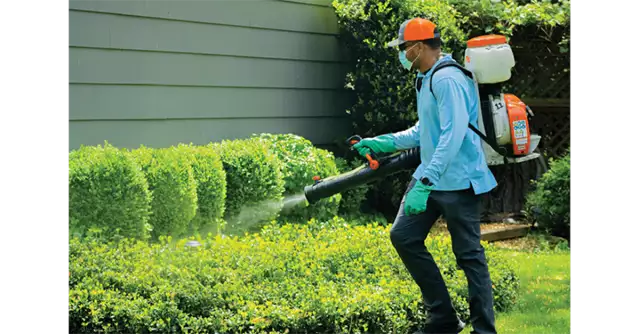Breeding ground for growth
Demand for mosquito control has grown in recent years, and the setup heading into spring has many service providers feeling upbeat. “I base my sales forecast on historical data, along with an understanding of how mosquito populations breed,” says Jim Laramee, a NaturaLawn of America and Mosquito Ranger franchisee in North Attleboro, Mass. “The last three years have been our biggest growth years ever. I think people have been sitting around more and actually reading their direct mail. I think that has helped us and the entire mosquito industry because more consumers now realize it is an actual industry. Instead of spending money on vacations, a lot of people have been spending more money at home. I don’t think that will change this year.”
In New England, Laramee says last year’s weather conditions may also play a role in fueling demand this season.
“We had a lot of mosquito activity up here last year and had more rain than we’d had in probably 30 years,” Laramee says. “When you factor those high water tables with the heat and humidity we got, it created the perfect breeding ground for mosquitoes.”
“Across the U.S., most regions experienced slightly above average to above average threat levels last year,” says David Price, an associate certified entomologist and technical director for Mosquito Joe. “Increased rain, combined with elevated temperatures, produced hotter and wetter climates than normal. We also saw several storm systems and hurricanes move across the U.S., causing flooding and leaving behind a tremendous amount of standing water — the perfect environment for elevated levels of breeding.”
Looking ahead to this season, Price predicts moderate spring mosquito pressure, referencing the following spring weather forecast:
• Northeast — normal precipitation, above average temperatures
• Southeast — below average precipitation, above average temperatures
• Central — above average precipitation, above average temperatures
• Southwest — below average precipitation, above average temperatures
• Northwest — above average precipitation, normal temperatures
Looking ahead to the summer, Price anticipates above average temperatures and normal precipitation throughout most of the country, except for the lower Northeast where higher rainfall is expected in an area stretching to Florida and Illinois.
“The overall high heat and average precipitation will lead to moderate mosquito pressure this summer, except for those areas with above average precipitation that will experience higher pressure,” Price says.
New species spell trouble
Rick Yates, a NaturaLawn and Mosquito Ranger franchisee in Wilmington, Del., says weather in the Mid-Atlantic region has been steadily warmer and wetter over the past five to 10 years. Based on that trend, he is expecting mosquito levels to continue increasing in his market. There is one species in particular that has been causing a lot of buzz in the Mid-Atlantic region.
“We have witnessed a dramatic increase in the Asian Tiger (Aedes albopictus) mosquito population in the past five years,” Yates says. “It is an aggressive daytime feeder, increasing the likelihood of finding and feeding on humans.”
Price says there are two other invasive species that have become established in the U.S. These mosquitoes have adopted behaviors similar to the container breeders typically found in backyards.
“One species, Aedes scapularis, is now established in Florida and has the capability of spreading across the South according to a study published in the Journal of Medical Entomology by Lawrence Reeves, Ph.D. et al,” Price says.
“This species can spread yellow fever, Venezuelan equine encephalitis virus and other human pathogens. The other invasive species, Aedes notoscriptus, was recently introduced into southern California and is rapidly becoming well-established. It has the potential to spread globally, according to another study published in the Journal of Medical Entomology by Marco Metzger.
“At present, this species has not been as well-studied as its cousins, Aedes aegypti and Aedes albopictus, because it was not associated with diseases like West Nile virus,” Price says. “However, it has been associated with the Ross River and Barmah Forest viruses in Australia, as well as canine heartworm in California.”
Building awareness
The potential of mosquitoes spreading disease, or even just becoming a nuisance, is all some mosquito control professionals need when selling their services.
“More people are coming to realize that mosquito control services are even an option,” says Brandon Sheppard, a Weed Man and Mosquito Hero sub-franchisor and franchisee in the Southeast. “When you combine that with certain economic factors, such as many households having more disposable income on hand right now, a larger swath of the population becomes potential new customers.”
With COVID transmission rates still at a high level and people continuing to spend more time at home, the recipe is there for a strong mosquito control season this year.
“Our typical mosquito customer is at the higher end of the lawn care market,” Sheppard says. “They are not only spending more time at home but are also more concerned about their health.
“With the ongoing pandemic, the best way for people to gather with minimal risk is outside. Mosquito control provides an effective way for people to enjoy their property more, but also better protect the health of their family and pets.”
On the topic of health, Sheppard says the mosquito control industry has also gotten a boost from the veterinary industry. “Veterinary professionals have done an excellent job of drawing the connection between mosquitoes and canine heartworm,” Sheppard says. “It doesn’t take long for the average homeowner to think, ‘If mosquitoes can spread that to my pets, what might they be doing to me?’”
According to Sheppard, the ideal mosquito control customer wants to work with a professional. They want someone who is properly trained and licensed, but also very measured in how they make treatment choices. As Sheppard explains, treating for mosquitoes is about surgical precision as opposed to broadcast application.
“Mosquitoes are poor flyers,” Sheppard says. “They also have very soft bodies, so they can’t handle areas with a lot of wind or sunlight. Mosquitoes also want to roost in areas near where they are going to feed.
“This helps identify areas on a property that should be treated. For example, mosquitoes are going to be under porches and decks, under the leaves of plants and on low, shaded walls. This makes it possible for our applicators to target mosquitoes while protecting pollinators because pollinators go to flowers. Mosquito programs are very prescriptive and create an opportunity to highlight the professionalism of your company.”
Laramee has discovered that the potential market for mosquito control is larger than the market for lawn care.
“Lawn care is more of a luxury item whereas mosquito control is a necessity,” Laramee says. “Especially with people staying home more nowadays, having backyard firepit parties and the kids playing on the Slip ’N Slide, I think a variety of people are going to see the value in hiring a mosquito service. So, for lawn care, we like to target a certain income level and home value. For mosquito control, everybody is a prospect.”
As the market for mosquito control has grown, so has the number of service providers.
“This has become an extremely competitive service,” Yates says. “When we started more than 15 years ago, we were the only business in Delaware licensed to treat mosquitoes. Today there are dozens of companies offering this service. But because of that, one obstacle we no longer have to contend with is consumer awareness and skepticism.”
Davey Resource Group, a subsidiary of The Davey Tree Expert Company, is pleased to announce the addition of BDY Environmental of Nashville, Tennessee.
For over 25 years, BDY has provided wetland, stream delineations and permitting; wetland and stream restoration and mitigation services; surface and groundwater consulting; National Environmental Policy Act (NEPA) services; endangered species surveys and consultation; and comprehensive groundwater assessment and remedial site services. BDY serves Tennessee and surrounding states with 10 professionals, all of whom will be joining the DRG team.
READ MORE: DRG added a team in Buffalo earlier this year
“Davey Resource Group is a leader in the environmental consulting industry, and we are thrilled to join the Davey family. Our clients will quickly notice the expansion of talent and expertise they will have at their disposal, as well as an increased diversity in the services we can offer," said David Jackson, managing partner and majority owner of BDY. "Additionally, BDY employees will benefit from Davey’s legacy and culture of employee ownership. I am truly excited for what the future holds for the BDY team and our clients.”
“Bringing in a team the caliper of BDY is really exciting for Davey," said Karen Wise, vice president of Environmental Consulting at DRG. "Similar to DRG, BDY has a strong commitment to the environment and to providing quality service to their clients. BDY employees will have tremendous opportunities to grow in their careers and expand their knowledge, as well as become employee owners.”
With the lawn care season in full swing, there are more problems for LCOs than just troublesome weeds this year. An ongoing labor shortage compiled with inflation, rising fuel costs and supply chain disruptions has made this season tougher than most.
“The biggest nuisance we have right now is a tie between interest rates, gas prices and labor,” says Steve Middleton, owner of the Raleigh, N.C.-based Middleton Landscapes.
Middleton says he’s adjusted his crew sizes to deal with the lack of labor.
“We’ve trimmed some of our crews down from five-man crews to four-man crews when someone leaves,” he says. “We just try and work with it.”
Middleton adds that a recent shift to a four-day workweek has also helped with employee retention and efficiency.
“We also went to a four-day work week and that’s worked out pretty well for us,” he says. “And now Friday becomes a makeup day if we’re rained out or something… but we try to give everyone Friday and Saturday to be with their families.”
But having enough manpower to stay on schedule isn’t the only challenge Middleton is facing. He says a lack of availability for some fertilizers, herbicides and other supplies has been difficult to navigate, not only for him but other lawn care companies in his market.

Because of this, Middleton says he thanks his lucky stars that he stocked up on the essentials when he did.“It’s been hard to get a few of our pesticides,” he says. “But I do things a little bit different…when COVID first hit I tried to be proactive. I was thinking and perceiving that we might have some issues with supply chains, so I started buying up a lot of my herbicides and things… I’ve got a whole storage unit full.”
Middleton credits his nearly four decades in the industry as his reasoning for being so proactive.
“I’ve been in this business since 1983, and I’ve seen some bad times…so I learned from those, and I try to watch the market and how it reacts to everything,” he says. “I try and see things as they start coming.”
And Middleton’s mindset is continuing, as he already is starting to plan out and purchase what he’ll need for the upcoming fall and winter.
“I’m already trying to buy seed for the fall just to be a step ahead,” he says. “Most people wouldn’t worry about that until September, but I’m not that way. I want to know what I’ll have in stock and so I can promise my customers we’ll have it.”
“A lot of my friends and colleagues in this area mostly use the same fertilizer,” he says. “We couldn’t get it for the first six months of the year. But I had some and I shared it.”
Massey Services, a company in the pest management industry, has acquired Peninsular Pest Control Service.
Peninsular Pest Control, also known as the “Critter Gitter,” is headquartered in Jacksonville, Florida. The company provides residential and commercial pest control, termite and landscape services to 30,000 customers throughout Northeast Florida, including Jacksonville, St. Augustine and Ponte Vedra.
READ MORE: Massey got a new CEO in 2021 | See where Massey ranked on our Top 100 list

“We are pleased to welcome the Peninsular team members and customers to the Massey Services organization,” said Tony Massey, president & CEO of Massey Services. “Peninsular Pest Control is a second generation, family-owned organization that has been providing superior service to customers for nearly 70 years. We look forward to carrying on their legacy of total customer satisfaction for years to come.”
Massey Services was founded in 1985 in Orlando, Florida. The organization now has 177 locations company wide.
Participate in SiteOne Landscape Supply’s 2022 VETS1 Virtual 5K to support veterans, military and their families. All proceeds of the race benefit Feherty’s Troops First Foundation to support the wellness and quality of life for post 9/11 combat-injured warriors. Register online by Sept. 5, 2022.
“We are privileged to bring the SiteOne community together to honor our military,” said Chris Nickelson, VETS1 president and SiteOne area sales manager. “Gather your family and friends to raise proceeds and awareness for Feherty’s Troops First Foundation, an organization working tirelessly to support our heroes, many of whom we see every day in our neighborhood branches.”
Feherty’s Troops First Foundation 's mission is to develop, operate and support wellness, quality of life and event-based initiatives for today's combat-wounded military personnel.
“Partnering with SiteOne brings incredible awareness to our efforts of facilitating a greater recognition of the quality and character of those who volunteer to serve,” said John Ablon, chairman of Feherty’s Troops First Foundation.
This year’s theme is Battle of the Branches. Participants will select which SiteOne branch to support and which branch of the military to represent. Registration is $40 for adults and $15 for youth, and includes a T-shirt and medal. The 5K can be completed in any location between Oct. 1 and Nov. 11, 2022.
Learn more about Feherty’s Troops First Foundation and register here.







